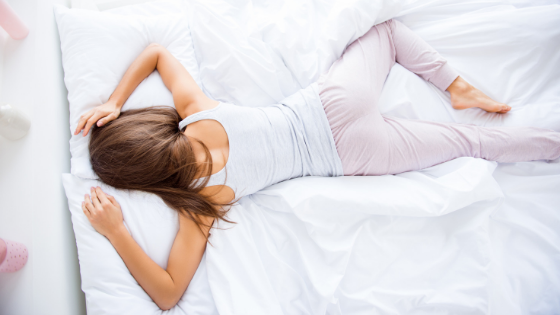
03 Jan How Sleeping Impacts Back Pain
Back pain can often be tied to your sleeping patterns. Your mattress, pillows, and sleeping positions can impact your back. With the amount of time spent in bed nightly, getting adequate back support is vital and can help you to prevent chronic back pain.
Sleeping Positions
Some positions will provide more support than others. If your body is twisted into a contorted position for hours at a time while you sleep, you will likely wake up with neck and or back pain. The position you sleep plays a big role in managing back pain.
Typically, the worst position for you to sleep in is on your stomach. This provides little support to your back and puts a strong strain on your neck. When you are sleeping on your back, it is best not to use a pillow, keeping your head more even with your body and not putting as much strain on your neck.
Side sleeping is the most popular position, especially among women (who statically experience back pain more than men). Depending on how you sleep on your side and what support is offered to your hips and shoulders, it may or may not put strain on your body. If you are sleeping on your side, for prime support, bend both knees slightly and use a small pillow placed between your legs to prevent placing stress on your hips and back. Sleeping on your side with your legs straight can exaggerate your lower back, however, sleeping with your legs curled up too tightly will lead to a curved back and strain on the spine.
The most recommended position for sleep is on your back. With a good mattress, sleeping your back provides optimal support for both your back and neck. Your specific needs may vary. Some people will benefit from a small lumbar support pillow place beneath their lower back.
Finding the Right Mattress
If you sleep the recommended eight hours a night, you are spending one-third of your life in bed. With that amount of time spent there, a good mattress is worth investing in.
Soft mattresses can be bad for your back, though they may be comfortable and cushy, they often don’t provide the support that is needed. A firmer mattress is usually better for your back. The firmness your back needs will vary based on your build and body structure. An ideal mattress should provide support and comfort. You should wake up from your sleep feeling rested, not stiff. A good mattress is made up of firm support at its core—such as a sturdy foam layer or inner springs, and a more cushioned layer on top to provide comfort. Your bed should prevent pressure points and pain, particularly in places like your hips and shoulders. Finding the right mattress to best support your body build will be well worth the investment.
Mattresses should be replaced regularly. Similar to running shoes, once your mattress sees a certain amount of use, it needs to be replaced regardless of how much time has passed.
Waking Up
Take a minute to stretch and wake up before getting out of bed. Making quick and sudden movements when your body is still stiff from sleep could lead back strain or even a pulled muscle.


Sorry, the comment form is closed at this time.